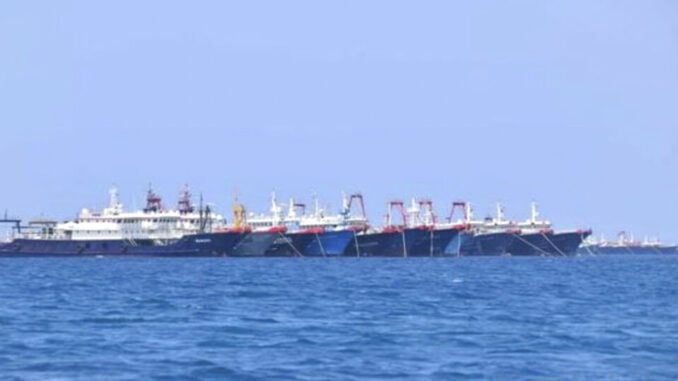
UNITED NATIONS — The United States and China clashed over Beijing’s actions in the South China Sea at a high-level U.N. Security Council meeting on maritime security Monday that also put a spotlight on attacks on ships in the Persian Gulf, piracy in the Gulf of Guinea, and drug and human trafficking in the Mediterranean and Atlantic Ocean.
Indian Prime Minister Narendra Modi, whose country holds the council presidency this month and chaired the virtual meeting, warned that the world’s oceans and seas which are the common heritage of all nations and peoples are facing various threats. He pointed to piracy and terrorism, the erection of trade barriers by some countries, and challenges from climate change and natural disasters.
U.S. Secretary of State Antony Blinken responded to China’s increasingly assertive claims to parts of the South China Sea, despite the ruling of an international tribunal five years ago rejecting its claims, by warning that conflict there or in any ocean “would have serious global consequences for security and for commerce.”
“In the South China Sea, we’ve seen dangerous encounters between vessels at sea and provocative actions to advance unlawful maritime claims,” he said. “The United States has been clear its concerns regarding actions to intimidate and bully other states lawfully accessing their maritime resources.”
In the latest incident last month, China’s military said it chased a U.S. warship from an area that it claims in the South China Sea, a statement the U.S. Navy called false.
Blinken stressed that it is “the business, and even more the responsibility,” of the United States and all other countries “to defend the rules that we’ve all agreed to follow, and peacefully resolve maritime disputes.”
China’s deputy ambassador, Dai Bing, shot back by accusing the United States of becoming “the biggest threat to peace and stability in the South China Sea” and calling its “hype” in the Security Council “entirely politically motivated.”
He called the arbitration tribunal’s award to the Philippines “invalid and without any binding force,” claiming that “there were obvious errors in the determination of facts.”
The situation in the South China Sea is generally stable, he said, and Beijing is striving to reach a code of conduct for the sea with the 10-member Association of Southeast Asian Nations.
Dai also said the U.S. “has no credibility on maritime issues” because it isn’t a party to the U.N. Convention on the Law of the Sea, which defines the rights and responsibilities of nations in their use of the world’s oceans. The U.S. has not ratified the convention, which came into effect in 1994, but has said it recognizes the treaty as part of international customary law.
Blinken told the council that when any country faces no consequences for unlawful maritime activities “it fuels greater impunity and instability everywhere.”
Elsewhere, he said, countries “are also provocatively and unlawfully advancing their interests,” pointing to Iranian actions in the Persian Gulf and Russia’s in Ukraine’s internationally recognized territorial waters in the Black Sea, Kerch straits and Sea of Azov.
Blinken said Washington is “confident” that Iran attacked the Mercer oil tanker on July 29 off Oman using explosive drones, killing a Briton and a Romanian. This is “part of a pattern of attacks and other provocative behavior” by Tehran that “threaten freedom of navigation through this crucial waterway, international shipping and commerce, and the lives of people on the vessels onboard,” he said.
Modi called for removal of barriers to legitimate maritime trade that threaten the world economy, resolving maritime disputes peacefully, and jointly fighting maritime threats from cyclones, tsunamis, pollution, piracy and over-fishing.
Ghada Waly, director-general of the U.N. Office on Drugs and Crime, told the council that the time-honored freedom of navigation “has come increasingly under threat.”
She cited “acute challenges” from piracy, armed robbery, terrorism and trafficking in drugs, humans, waste, nuclear materials and firearms as well as illegal fishing and unlawful damage to the marine environment. She also warned of the “critical vulnerability” of submarine cables carrying the world’s internet traffic.
She said record shipments of cocaine were seized in European ports during the pandemic according to her office’s 2021 World Drug Report.
As for piracy, Waly said 90% of kidnapping incidents have occurred in the Gulf of Guinea, where a new study found that “some six pirate groups, with 30 to 50 members each,” can now attack in deeper waters, mainly targeting international vessels to kidnap crew members for ransom.
The pirates’ combined income has been estimated at some $4 million per year, but the economic impact has been estimated around $800 million, she said. The first half of 2020 saw a 20% increase in piracy and armed robbery incidents against ships compared to the same period in 2019.



